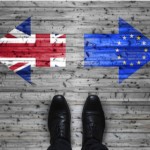Aliasger Bootwalla (AB): Welcome to the Gateway House podcast. This is Aliasger Bootwalla, Media and Outreach Associate, at Gateway House. We have with us Ambassador Neelam Deo, Director and Co-founder, Gateway House, who will be discussing Brexit.
Neelam, Britain left the European Union a week ago. What will be the immediate outcome for the UK and EU?
Neelam Deo (ND): There will be no immediate outcome, as a matter of fact. Because, what will happen is the commencement of one year of negotiations with the EU for the UK to leave it. The unanimous expectation is that they will not manage to negotiate an orderly departure, but the UK prime minister has said that they will leave in any case. I think nothing will happen tomorrow, but over the year, it is not clear how the negotiations will go, although all the European leaders have generally expressed their desire to have the departure in as amicable a way as possible and try to retain the best ties they can.
AB: What do you think will be the larger geopolitical impact of Brexit?
ND: There are two ways to look at the impact of Brexit. One is the UK itself, which will naturally diminish in stature within Europe, but also globally. The UK has benefited greatly in the economic sphere by being a part of the EU. But, of course, its role in the North Atlantic Treaty Organisation (NATO) will continue, and quite a lot will depend on whether it is able to inject more meaning into what it calls the ‘special relationship’ with the United States. You saw that American secretary of state, Mike Pompeo, was in the UK on January 30. So clearly, they were discussing many issues, including a possible trade agreement. But when he came out, the one thing he said was that he had tried to impress upon his UK host the importance of turning down Huawei’s offer of 5G technology.
AB: Yes, Mike Pompeo was in the UK yesterday when he mentioned that Brexit will be “fantastic” for the U.S. What is the future of the UK-U.S. partnership, especially in geopolitical and security areas?
ND: I think we should not give too much importance to words like “fantastic” because the American President and his appointees tend to use hyperbolic language. I don’t know what “fantastic” means as he had gone there possibly to extend a firm position on 5G and Huawei, which the Americans have consistently advised all their treaty partners, particularly the Europeans, not to go in for. This is very important in the context of intelligence-sharing. As you know, the UK and U.S. are part of the Five Eyes intelligence arrangement, which also includes Canada, Australia and New Zealand. The Americans have made it quite clear that intelligence-sharing with the UK will be affected adversely if it allows in Huawei.
Whether there will be an impact on the U.S.-led NATO, of which obviously the UK is an important member, remains to be seen since the weapons systems tend to be sourced from America. This depends on how the other European countries will proceed with raising their investments in the defence forces, industries, as well as the world around them. For instance, if they are able to normalise their relationship with Russia – which the French, the Americans, and probably the Germans want – then the importance of those differences within NATO may decline.
AB: Lastly, how will Brexit affect India’s relations with the EU and the UK?
ND: There will be an effect because everyone is used to a relationship with the UK. Indians love visiting the UK as tourists, there are many students who continue to go there for some good, and some indifferent, courses of study. And many Indian firms have invested in the UK. They have their head offices there as they earlier saw it as a gateway to Europe. But over the last three years – since the UK first voted to leave the EU – everyone has known that the UK will no longer provide access to the EU. So, many firms have not necessarily shifted their headquarters to other capitals – Frankfurt, Paris, Amsterdam. They have checked and made other arrangements. But there will still be an impact – especially on the IT industry. The UK was the second or third largest market for Indian IT services. Even there, it is interesting that now the EU is a bigger market than the UK for our IT services.
Produced by Aliasger Bootwalla, Aashna Agarwal
Theme by Rohan Dalal
Podcast: Play in new window | Download
Subscribe: Apple Podcasts | Email | RSS



